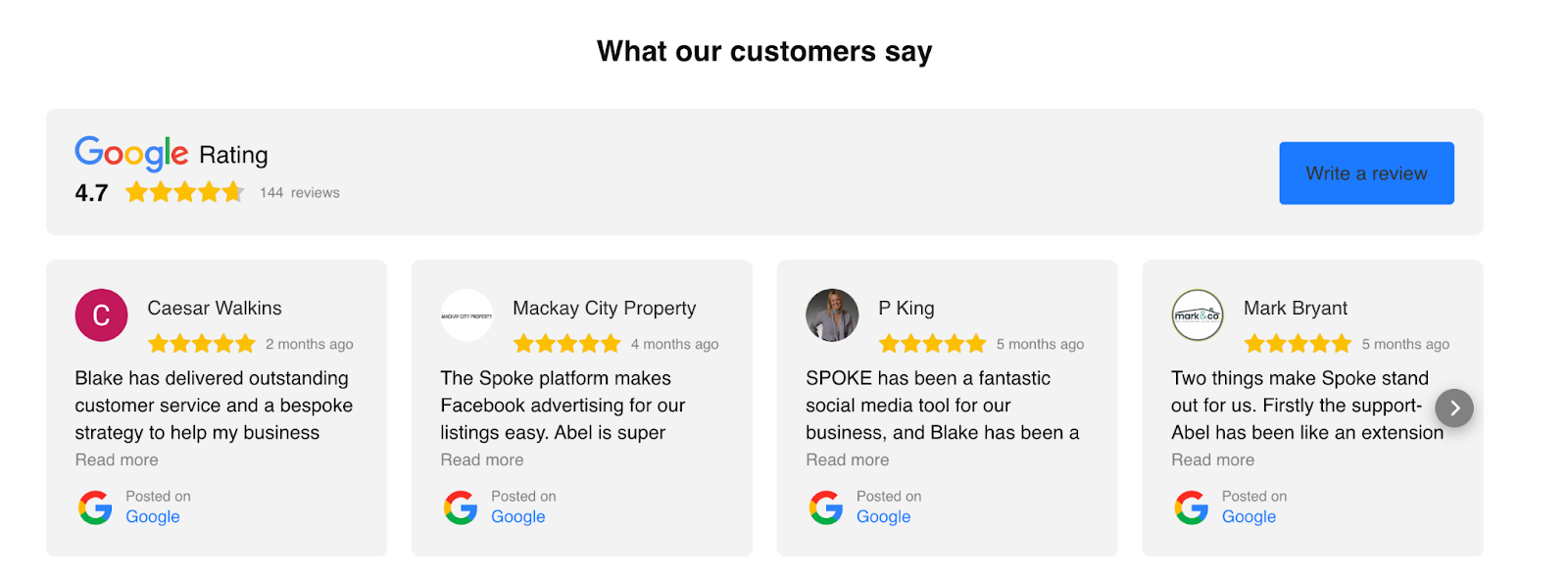
Whether you're a solo agent or running a real estate agency, your website is one of your most valuable assets. It's where potential clients can learn more about you and your services, and it's the first place they'll go when they're ready to buy or sell a home. So if learning how to generate leads through your website is what your agency needs, here are 12 actionable tips to get your started.
1. Keep your Google My Business listing up to date
Maintaining your Google My Business (GMB) listing is crucial for localising your business. If a customer searches for your brand, they should be able to find your GMB snippet and locate your office on Google Maps easily.
A customer who finds an outdated profile will be less likely to trust your services and become frustrated if they’re using outdated contact information.

Make sure to update details like opening hours, address, website URL, phone number and any other contact info Your GMB listing is often the first impression potential clients will get of your business - do yourself justice by ensuring it remains a positive reflection of your agency!
2. Optimise for search engines
Search engines are the first place your prospects will turn to when beginning their buying or selling journey. A study by Zero Limit Web shows that over 67.60% of all clicks go to the first five organic search results, meaning optimising your website for a high ranking is critical if you want to attract more website traffic without having to rely on paid sources.

Don’t let poor SEO hinder your lead generation. Get started with these fundamental SEO activities:
- Consider the search terms you want your website to rank for and base your SEO stratgey around these keywords.
- Webpages should contain page titles, H1 tags and meta descriptions that include your target keywords.
- Internal linking should group pages together into content topics to help Google to better crawl your site.
- All important pages should be accessible from your homepage within 3 or less clicks.
- Page load speeds should be as fast as possible to avoid penalisation.
3. Optimise for mobile user experience
In an increasingly mobile-first age, it's more important than ever to make sure your website functions well on any device. Studies show that over 64% of searches are conducted through smartphones and tablets! Improving your website’s mobile experience will ensure every user has a stellar experience no matter what they're using and increasing your ability to capture more leads.
Optimising your website for mobile not only has a positive impact on user experience. Google now uses mobile-first indexing of your website’s content to rank your pages, meaning it can be a huge boost to your SEO. Taking some time to regularly audit and update your website’s mobile experience will ensure valuable traffic isn't obstructed by glitches or issues due to the constantly changing landscape of technology.

4. Make website navigation easy and intuitive
User experience has a huge impact on your website’s ability to convert visitors to leads. A study conducted by Google revealed that people typically make the decision to stay or leave within 50 milliseconds of landing on your website. When a visitor lands on your website they should be able to quickly and easily navigate their way to the information they expect to find. When your website visitors can't find what they're looking for quickly, you can guarantee they’re going to bounce.

Ensure your visitors are able to easily find and navigate your listings, run location based searches and easily get in touch. After all, isn't that how you'd want to be treated if you were visiting someone else's website? So don't let your visitors wander aimlessly through an unorganized labyrinth - give them an easy-to-follow roadmap so they can get where they need to go.
5. Write for your ideal client
Are you writing your website copy with your ideal customer in mind? If you’re looking to attract more seller leads you’re website will need to win their trust. It's vital that your website copy resonates with your audience, addressing their challenges and needs as they learn more about you.
The AIM framework is a great starting point for improving the effectiveness of your website copy.

Who is your Audience?
Build buyer personas for your ideal customers, and keep it top-of-mind with all your website copy. Here are a few questions to ask yourself when defining your audience:
- What challenges are your prospects facing?
- What are your prospects trying to achieve?
- Which channels are your prospects turning to in order to find the information they’re looking for?
What is your Intent?
Your intent should never be simply to inform. You should be trying to motivate and inspire your prospects to take some sort of action. Questions to ask yourself to define the intent of your content:
- What is it exactly that you want your audience to do with your recommendations?
- What are the concrete next steps?
- Who should complete certain actions? By when?
What is your Message?
It’s time to craft your message only after you’ve completed the previous two steps. It should strike the right balance between your audience’s pain points and your business goals. A great message will be brief, memorable, repeatable, emotional and data-backed
Hiring a professional copywriter is a great way to ensure your website copy is written to convert.
6. Communicate a clear call to action
Want your website visitors to take action and get in touch? You’ll need to an effective call to action that stands out and resonates. Here are the top three tips to help you craft the perfect call to action:
- Simplify to amplify - Keep your call to action short, sweet, and straightforward so people know exactly what they need to do.
- Create a sense of urgency - Use words like “now” or “today” in order to create a sense of urgency and encourage people to take immediate action.
- Use action words - Choose strong verbs like “discover” or “unlock” that will motivate people into taking the desired action.

7. Use multimedia to sell your listings
Video and VR tours of property listings have become expected functionality on real estate websites. If you’re not using multimedia to promote your listings you could be missing out on a stack of potential leads. Not only will you attract more buyer leads, who expect to be able to hunt for property from the comfort of their own home, but you’ll impress more potential sellers with the way you market your property.
Additionally, video is a great medium to promote your brand. Use it to introduce your agents, show engaging suburb profiles and communicate your expertise and vision. With the right video content, you can provide a more engaging and meaningful experience for your website visitors and increase the chances of them converting into leads.
8. Attract more buyers and sellers with articles and profiles
Using your website to provide valuable content to your prospects will show them that you’re an authority in the industry and they can trust you with their business.
Articles are a great way to provide useful information about the real estate market and showcase your expertise. Writing articles on topics such as tips for first-time homebuyers, how to find the perfect neighborhood, or even advice on staging properties can help attract new buyers and sellers. Plus, these articles can be optimised with keywords that will help them rank in search engine results and drive more traffic to your website.
Profiles are also a great way to showcase the services you offer and give potential buyers and sellers an insight into what it's like working with your team. You can create profiles about yourself, your team members, or any properties you have listed or recently sold.
When writing content for your real estate website, it is important to make sure that it is well-written and engaging. Use language that will appeal to potential buyers and sellers, and make sure your articles are accurate and up-to-date.
9. Leverage your website traffic data to retarget your visitors
By taking advantage of cookie tracking and first-party data capture you'll be able to track your audience's behaviour on your website. Are they looking at listings in a certain price bracket, or have they been reading your articles on home-selling tips? Use this information to deliver retargeting ads tailored to their interests.
If your website visitor isn't quite ready to get off the fence, retargeting them on platforms like social media will help you stay top of mind and ensure you're the first phone call they make when they're ready to take the leap. Tools like Rex Reach will help you reach more prospects with hyper-targeted digital ads.

10. Provide personalised lead nurture
When it comes to marketing your business and listings, nothing gives you an edge like personalisation. It helps create unique experiences for leads that keep them engaged and interested in what you have to offer—ultimately driving conversion rates up!
To get the most out of a personalised lead nurture strategy, make sure your forms capture enough data so you can segment prospects according to their needs and interests. Then tailor those messages accordingly. Make the most of your CRM integration to apply automated lead nurture workflows.
11. Show your client testimonials
We all know word-of-mouth is one of the most powerful ways to get new clients—but online reviews are a close second! Studies show up to 90% of people read and trust customer feedback, which makes it an essential ingredient for any high-converting website.
Don’t miss out on this great way to increase your reputation: ask every client you help with their home sale if they're willing to share why they chose you as agents, what went well during the process, and (most importantly) whether or not they'd recommend your business. Showcasing these glowing testimonials can do wonders in encouraging even more referrals down the line!
12. Deal with negative Google reviews
Just like positive reviews, negative ones are going to be weighed up in your prospects decision making process. Your Google reviews are one of the first places your prospect will turn to before deciding to engage your business. Bad reviews happen, but taking the time to address them properly shows that you care about your clients.

In fact, a study conducted by TripAdvisor found that 89% of users said a thoughtful response to a negative review improved their impression of a business. So to make the best out of a bad situation and reply thoughtfully to your negative reviews, offering a solution where possible.
Where do I go from here?
By following these 12 tips, you'll be well on your way to becoming a real estate lead generation machine. From making sure your Google My Business listing is up-to-date to writing for your ideal client, and showcasing your testimonials, putting a little extra effort into your website optimisation will pay dividends in the long run.
So if you’re keen to learn how to generate more leads in real estate but don’t want to do it on your own, get in touch with the team at Rex Websites. We’ve spent years fine-tuning our websites to give your visitors the best possible experience and help you achieve your agency’s goals - showcasing your brand, generating more leads, and selling more properties.




.png)






